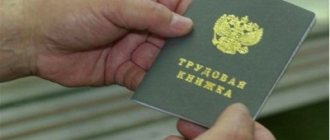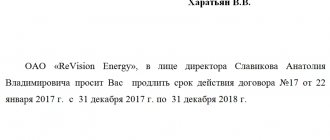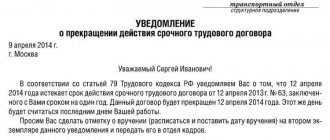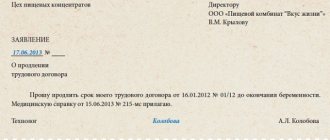The modern realities of the Russian economy oblige companies to work more and more productively. The efficiency of work, first of all, depends on the staffing of workers and their qualifications. This forces employers not only to send employees for advanced training, but also to look for personnel in educational institutions of higher and secondary specialized education. By hiring students and training staff, you can strengthen your position in the market. At the same time, this approach is fraught with some legal difficulties and implies some features of personnel records management.
First of all, the Labor Code does not contain such a concept as “student”. Due to the specifics of labor legislation, it is provided for: employees sent for training, either independently enrolled in training under various programs, or combining work with training (Articles 173, 174 of the Labor Code of the Russian Federation). In addition, Art. 173.1 provides guarantees and compensation for employees combining work with higher education - training of highly qualified personnel.
The category of students includes persons mastering educational programs of secondary vocational education, bachelor's, specialist's or master's degrees (clause 3, part 1, article 33 of the Federal Law of December 29, 2012 No. 273-FZ “On Education in the Russian Federation” (hereinafter referred to as Law No. 273-FZ). Students can be conditionally divided into those receiving specialized secondary education and those receiving higher education (bachelor's and master's degrees). Persons with a basic general or secondary general education are allowed to study in a secondary vocational education program, and those who have a higher education program are allowed to study in a higher education program. – average general (Articles 68, 69 of Law No. 273-FZ).
Since the minimum age of a student is not determined by the legislator, and admission to a university is possible before the onset of minority, when formalizing the relationship, the employer must also take into account the norms related to the work of minors.
Registration of relationships
Modern labor legislation provides for several options for legally establishing the relationship between an employee and an employer, which are based on the conclusion of an agreement - an employment contract.
Article 58 of the Labor Code of the Russian Federation provides for the conclusion of an employment contract for an indefinite period and for a certain period (no more than five years). At the same time, concluding a fixed-term employment contract is mandatory for performing work directly related to practice, vocational training or additional professional education in the form of an internship. In addition, a fixed-term employment contract can also be concluded with a person receiving full-time education, if this is stipulated by agreement of the parties (Article 59 of the Labor Code of the Russian Federation).
Thus, the relationship between an employer and a person mastering educational programs of secondary vocational education, bachelor’s, specialist’s or master’s programs can be formalized as follows:
- conclusion of an employment contract for an indefinite period;
- conclusion of a fixed-term employment contract: to perform work directly related to practice, vocational training or additional professional education in the form of an internship;
- by agreement of the parties with the person undergoing full-time training.
Labor legislation does not provide for any specifics when concluding an employment contract with a student for an indefinite period. Such an agreement is concluded in the usual manner, as with other employees.
Peculiarities of personnel relations
Possible options for formalizing relationships with persons who have entered or are undergoing training have been listed above. However, there are a number of important practical issues that arise when forming relationships with students and which must be remembered.
- A student is hired in the usual manner provided for in Art. 65, 66 of the Labor Code of the Russian Federation, taking into account the fact that, as a rule, this is the first employment and the employer is obliged to issue a work book and an insurance certificate of state pension insurance in the absence of it. It is not required to confirm that the student is studying in secondary specialized or higher education organizations.
- It should be additionally noted that when concluding an employment agreement with a student who has not reached the age of majority, the employer does not have the right to establish a probationary period (Article 70 of the Labor Code of the Russian Federation). The same prohibition applies to persons entering into a fixed-term employment contract for a period of up to two months. Among other things, when concluding an employment contract with a person who has completed training in secondary vocational or higher education programs, the employer also does not have the right to establish a probationary period for one calendar year after completion of training if the former student is employed for the first time. Also, a probationary period is not established for persons who have successfully completed an apprenticeship when concluding an employment contract with the employer under the contract with whom they were trained (Article 207 of the Labor Code of the Russian Federation).
- The legislator does not regulate the procedure for registering a referral for training for an employee of an organization. It seems that fixing this fact in a free-form order will be sufficient. Such an order must indicate who is being sent to study what profession and to what educational institution.
Guarantees and compensation for students
The main feature of labor relations with students for the employer is a certain set of benefits, guarantees and compensation, which must be provided without fail.
How long is a fixed-term employment contract valid?
Before providing a sample - a short-term employment contract with an employee, we will tell you about its differences from an agreement without the prefix “fixed-term” or “temporary”. Essentially, it is a traditional work contract between an employer and a person hired to perform certain functions. It must describe the place of work and its conditions, wages and the procedure for their payment, the rights and obligations of the parties.
The fundamental difference is that in an agreement on short-term cooperation, a specific period is written about how long the industrial relationship will last. According to Art. 58 of the Labor Code of the Russian Federation, the employer has the right to conclude a fixed-term cooperation agreement for a period of up to 5 years. The minimum period is not specified, which means it can be 1 month, or 3, or 17.
It is important to understand that a fixed-term work contract can unexpectedly become open-ended. This will happen in two cases:
- The employer forgot that the agreement was expiring and actually missed the deadline for dismissing the temporary employee.
- The dismissal procedure was violated, including failure to provide notice of the upcoming termination of the contract. Read more about dismissing temporary subordinates below.
Features of providing guarantees and compensation
It is important to note that in accordance with Art. 177 of the Labor Code of the Russian Federation, guarantees and compensation for employees combining work with training are provided when receiving education at the appropriate level for the first time. However, an employee who is not receiving education at the appropriate level for the first time is not provided with guarantees and compensation unless the parties stipulate their provision in the relevant agreements (in an employment contract, in a collective agreement). The same position is confirmed by the Determination of the Constitutional Court of the Russian Federation dated 04/08/2004 No. 167-O: the norm of the Labor Code of the Russian Federation establishing the corresponding condition does not prevent the solution of the issue of guarantees and compensation for employees receiving a second higher education within the framework of collective-contractual and individual-contractual regulation and does not excludes the employer's obligation to provide such employees with benefits in connection with training, if this is provided for in a collective agreement or agreement between the employee and the employer.
Guarantees and compensations provided by the employer to employees are differentiated depending on the level of education (higher, secondary vocational) and type (full-time, part-time) and consist of granting study leave with or without pay. Another type of preference that an employer can provide to a student is reduced working hours in cases and under conditions provided for by labor legislation.
Guarantees for students receiving higher education
In accordance with Art. 173 of the Labor Code of the Russian Federation, for employees sent for training by the employer or who entered training on their own and who successfully complete a bachelor’s, specialist’s or master’s degree in part-time and part-time forms of study, the employer provides additional leave with preservation of average earnings for:
- passing intermediate certification in the first and second years, respectively - 40 calendar days, in each of the subsequent courses, respectively - 50 calendar days (when mastering educational programs of higher education in a shortened time in the second year - 50 calendar days);
- passing the state final certification - up to four months in accordance with the curriculum of the higher education educational program mastered by the employee.
The employer is obliged to provide leave without pay:
- for employees admitted to entrance examinations – 15 calendar days;
- employees - students of preparatory departments of educational organizations of higher education to pass the final certification - 15 calendar days;
- for employees studying full-time, combining education with work, for passing intermediate certification - 15 calendar days per academic year;
- for preparing and defending the final qualifying thesis and passing the final state exams – 4 months;
- for passing final state exams – 1 month.
Additionally, for students who successfully master bachelor's, specialist's or master's degree programs via correspondence study, the employer pays travel to and from the location of the educational institution once per academic year, and half the cost of travel for employees who master secondary vocational education programs. At the same time, the amount, conditions and procedure for compensation of expenses for payment of travel costs and baggage transportation to the place of use of vacation and back are determined by collective agreements, local regulations adopted taking into account the opinion of the elected bodies of primary trade union organizations, labor contracts (Article 325 of the Labor Code of the Russian Federation). Compliance with this provision by the employer in local regulations or in employment contracts will minimize financial costs if an employee abuses his rights. This position was confirmed, in particular, in the Appeal Ruling of the Supreme Court of the Komi Republic dated February 27, 2014 in case No. 33-919/2014.
For employees studying part-time and part-time forms of education, for a period of up to 10 academic months before the start of the state final certification, at their request, a working week is established, shortened by 7 hours. During the period of release from work, these employees are paid 50 percent of the average earnings at their main place of work, but not less than the minimum wage.
By agreement of the parties to the employment contract, working hours are reduced by providing the employee with one day off from work per week or by reducing the length of the working day during the week. It is recommended to formalize such a desire by drawing up an appropriate additional agreement indicating the method of obtaining the guarantee.
It is important that the above guarantees and compensations are established for workers who are trained in institutions that have the appropriate state accreditation. Guarantees and compensation for employees who combine work with training in bachelor's degree programs, specialty programs or master's programs that do not have state accreditation are established by a collective or labor agreement.
Work schedule
Working students have limited time that can be devoted to fulfilling their professional duties. This fact was taken into account by legislators in the Labor Code.
The law allows an employer and his potential employee to agree on a work schedule on an individual basis. For example, establish a shorter working week or a working day shorter than generally accepted. These two measures can be taken simultaneously.
In any case, the minimum number of working hours during the week is not limited by law .
It is quite possible for students to have a flexible schedule. This means that during a specified period, a working student must work at least a certain number of hours. In this case, the beginning and end of the working day, as well as the days on which you need to go to work, are set individually.
In relation to minor students, the maximum number of working hours is limited by law:
- Persons under 16 years of age may work no more than 12 hours per week;
- Between the ages of 16 and 18, this time increases to 18 hours.
Guarantees and compensations for graduate students and equivalent students
In accordance with Art. 173.1 of the Labor Code of the Russian Federation, workers mastering training programs for scientific and pedagogical personnel in graduate school (postgraduate studies), residency programs and assistant internships through correspondence courses have the right to:
- annual additional leave at the place of work lasting 30 calendar days with preservation of average earnings. In this case, the time spent traveling from the place of work to the place of training and back is added to the employee’s annual additional leave while maintaining average earnings. The specified travel is paid by the employer;
- one day off from work per week with payment in the amount of 50 percent of the salary received. The employer has the right to provide employees, at their request, in the last year of study with no more than two additional days off from work per week without pay.
Employees who are mastering programs for training scientific and pedagogical personnel in graduate school (postgraduate studies), as well as persons who are applicants for the scientific degree of Candidate of Sciences, also have the right to be granted at their place of work an additional annual leave of three months to complete a dissertation for the scientific degree of Candidate of Sciences while maintaining average earnings.
Leave for applicants for the academic degree of Candidate of Sciences or Doctor of Sciences is granted in the manner prescribed by the legislator in a separate regulatory act (clause 4.1 of the Federal Law “On Science and State Scientific and Technical Policy” dated August 23, 1996 No. 127-FZ). This procedure was approved by Decree of the Government of the Russian Federation dated May 5, 2014 No. 409.
Vacation is provided with the preservation of the average salary for a period of 3 months, respectively, to prepare for the defense of a dissertation for the scientific degree of Candidate of Sciences and 6 months for preparation for the defense of a dissertation for the scientific degree of Doctor of Science.
It is important that leave for applicants is granted on the grounds provided for in the specified resolution of the Government of the Russian Federation, and not in accordance with Art. 177 of the Labor Code of the Russian Federation, i.e. a summons certificate cannot serve as a basis for granting leave to an academic degree applicant. The basis for granting leave is a number of documents that the applicant is obliged to submit to the employer within the time frame specified by the legislator:
- Written notification of the proposed leave in connection with the defense of the dissertation (no later than 1 year before the start of the leave).
- An extract from the decision of the dissertation council on the acceptance of a dissertation for the academic degree of Candidate of Sciences or Doctor of Sciences on the acceptance of the dissertation for defense (this extract must be provided no later than 10 working days from the date of the decision).
- Application for leave indicating its duration (together with an extract from the decision).
Based on these documents, the employer decides to grant leave to the applicant. Such a decision must be made within 5 working days from the date the applicant submits an extract and application for leave.
Such leave is terminated due to the expiration of the period for its provision, the dissertation applicant’s withdrawal from defense at the dissertation council, the said council making a decision on the dissertation (positive or negative) or at the request of the applicant.
It is important that extracts from the decisions of the dissertation council are signed by the chairman and scientific secretary of the dissertation council, the signatures are certified by the seal of the organization on the basis of which the dissertation council was created.
Guarantees for students receiving specialized secondary education
Article 174 of the Labor Code of the Russian Federation establishes that the employer provides additional leave while maintaining average earnings for employees who successfully master secondary vocational education programs in part-time and part-time forms of education for:
- passing intermediate certification in the first and second years - 30 calendar days, in each of the subsequent courses - 40 calendar days;
- passing the state final certification - up to two months in accordance with the curriculum of the educational program of secondary vocational education mastered by the employee;
The employer is obliged to provide leave without pay:
- for employees admitted to entrance examinations – 10 calendar days;
- employees receiving secondary vocational education on a full-time basis and combining education with work, to pass intermediate certification - 10 calendar days per academic year;
- for passing the state final certification – up to 2 months.
The rules for granting leave to persons admitted to seek the academic degree of Candidate of Sciences or Doctor of Sciences are approved by Decree of the Government of the Russian Federation of May 5, 2014 No. 409.
Sample employment contract with a full-time student
Sample employment contract with a full-time student
Is it possible to conclude a part-time employment contract for an indefinite period with a full-time student?
List of messages New topic. Employment contract with a student: How to specify in the contract the duration of the working week for a full-time student who is 22 years old and full-time. And is it necessary to stipulate in the contract about mandatory leave for exams? Does anyone have a sample? Good afternoon, Anna, next question. Is the apprenticeship agreement applicable in this situation or is it a completely different story? The parties agreed to cooperate in the field of practical training of students. Provide the Enterprise with a program and internship schedule in advance for approval. Select the most qualified University teacher appointed by order as the head of practice. Before sending students to practice, warn students about the need to undergo a medical commission in agreement with the Enterprise. Ensure that students comply with labor discipline and internal regulations mandatory for employees of the Enterprise. Provide the employee of the Enterprise, the student’s internship supervisor, with methodological assistance in organizing and conducting the internship. Conduct a safety briefing for students before the start of practice. Provide, within the time frames provided for by the University’s educational process schedule and agreed with the Enterprise, places for internships for University students. Provide students with safe working conditions at each workplace. Conduct mandatory instructions on labor protection: Create the necessary conditions for the student to complete the internship program. Appoint qualified specialists to manage practice in workshops, departments, laboratories, etc. Provide for the possibility of moving students around workplaces in order to more fully familiarize students with the activities of the Enterprise in accordance with the internship program. Report in writing about all cases of student violation of labor discipline and internal regulations to the head of practice from the University. At the end of the internship, provide a description of the work of the student intern and the quality of the report prepared by him. Promote the employment of University graduates if there are vacancies. Duration of the agreement and other conditions 3. The parties are responsible for failure to fulfill contractual obligations in accordance with the legislation of the Russian Federation. All disputes arising between the parties under this agreement are resolved in accordance with the procedure established by the legislation of the Russian Federation. Number of places provided for internship and F.










